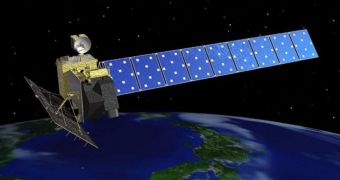After spending more than five years in Earth's orbit, a Japanese spacecraft was declared dead in orbit yesterday, May 12. Officials say that the vehicle suffered an unexpected error about three weeks ago, from which it was apparently unable to recover.
The spacecraft, known as the Advanced Land Observing Satellite (ALOS), or Daichi for short, was an Earth-monitoring spacecraft designed to map land surfaces in Asia and over the Pacific Ocean.
It launched on January 24, 2006, after suffering three delays due to various problems. It roared into space aboard a H-II delivery system, which was launched from the Tanegashima Space Center (TSC).
At around 2230 GMT, on Thursday, April 21, the spacecraft experienced an error that immediately activated its built-in power-saving mode. After a few hours, all power was lost from primary and secondary systems, and the vehicle went silent.
Experts at the Japan Aerospace Exploration Agency (JAXA) tried to “revive” the satellite for several weeks, but eventually they had to admit that there was nothing more they could for it, Space reports.
“We decided to complete its operations by sending a command from the ground to halt its onboard transmitter and batteries at 10:50 am on May 12 (Japan Standard Time), as we found it was impossible to recover communication with the satellite,” a JAXA statement reads.
However, this bad news has a silver lining, the officials add. ALOS was originally developed to conduct a three-year mission, but it exceeded that time frame by more than two thirds. This means that, for all intents and purposes, the mission was a resounding success.
From its orbital vantage point some 435 miles (700 kilometers) above the surface of the planet. Daichi snapped a total of 6.5 million images, which experts then used to create advanced maps of Earth.
In addition to this, the probe was also used to monitor disasters such as September 2007 Sumatra earthquakes and tsunamis. Similarly, it also helped emergency responders in Japan recently, following the magnitude 9.0, March 11 tremor that struck the country.
Officials at JAXA say that they will continue to investigate the reasons that lead to ALOS' failure. However, they add that lack of communications with the spacecraft during the past few weeks will make that a tad more difficult.

 14 DAY TRIAL //
14 DAY TRIAL //